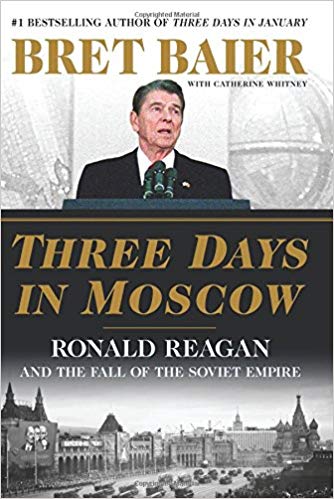
1Three Days in Moscow — Bret Baier
 Maybe it’s because he’s the first President that I can clearly remember, but for a long time, Ronald Reagan was my favorite President. Later on, I found that John Adams, John Quincy Adams, and Theodore Roosevelt ended up in the trio of my favorite leaders of the United States. However, my early intrigue regarding Reagan still echoes in some of the books I read about politics from the 1980s.
Maybe it’s because he’s the first President that I can clearly remember, but for a long time, Ronald Reagan was my favorite President. Later on, I found that John Adams, John Quincy Adams, and Theodore Roosevelt ended up in the trio of my favorite leaders of the United States. However, my early intrigue regarding Reagan still echoes in some of the books I read about politics from the 1980s.
Regardless of what you think about Reagan as a leader, he had a way with words. One of the earliest memories of him speaking was directly in the aftermath of the Space Shuttle Challenger disaster. “The crew of the space shuttle Columbia honored us by the manner in which they lived their lives. We will never forget them, nor the last time we saw them, as they prepared for their journey and waved goodbye and slipped the surly bonds of Earth to touch the face of God.”
Every generation has a moment that defines it and is remembered for the rest of their lives. My grandparents had Pearl Harbor and D-Day. My parents had the assassination of President Kennedy, while I had the fall of the Berlin Wall and the collapse of the Soviet Empire. President Reagan’s “tear down this wall” resonated with us, our first taste of adult politics in our life. Well, at least in mine.
That moment, and the events leading up to it, are the subject of this book, Three Days in Moscow. The summit between Ronald Reagan and Mikhail Gorbachev in 1988 marked the last meeting between the two men with Reagan as President. During that visit, Reagan spoke to students at Moscow State University in a speech that did not garner much attention at the time, although it was prescient to events that unfolded in the Soviet Empire the following year.
This book is a down to earth retelling of the history of the final days of the Cold War and Ronald Reagan’s place as a part of it. It was a perfect combination of the leadership of Reagan with the progressive nature of Mikhail Gorbachev in a time when the Soviet people were tiring of the oppressive nature of decades of unfettered communism.
Baier spends a good part of the early chapters building up how Ronald Reagan formed his views on the evils of communism. The buildup to the final summit in Moscow comes quickly. Baier writes Reagan’s story like he’s an old friend, and makes him feel like a member of the family to the rest of the readers.
This book borders on hero worship of Ronald Reagan by Bret Baier, but he does it with a style that makes the reader enjoy the history lesson. The one part of the book that I felt was forced and out of character with the rest of the book was the last chapter. In that chapter, Baier attempts to make the claim that President Trump is as eloquent as Reagan when he speaks, and oftentimes he hears Reagan channeled through Trump’s words. I respectfully disagree, this being the one item that keeps me from giving this book a full five stars. That whole chapter did not fit in with the rest of the book. It seemed like too much a stretch to try to tie these two Presidents together and totally detracts from the rest of the book. My advice, just skip that chapter.
Craig Bacon likes reading about Presidential history. Someday, he’s going to spend countless hours at several of the Presidential Libraries.
Originally published on Niagara’s Water Cooler. Republished with permission.
All WNY is made possible thanks to coffee and sleep deprivation.
We appreciate your readership. We like money, too.

